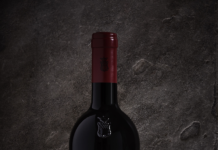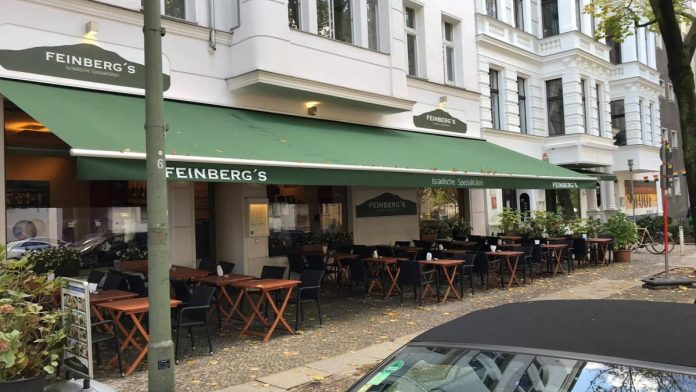
Berlin, Germany (Gastrosofie). Any guest who comes to Yorai Feinberg in Berlin’s Fuggerstraße, where Israeli specialties are served in his restaurant „Feinberg’s“ (sic!) can eat with a knife and fork, for sure, but also using his or her hands.
For that, lots of bread is placed on the table. The meal starts with an appealing appetizer, a dip plate for two or three people with three or five pitas cut into small pieces to dig into it. With this soft flatbread made from yeast dough we spoon away baba ghanoush, matbucha, beetroot dip, labaneh cheese and tahini in no time. Now, a soup or better in summer a beetroot carpaccio, garnished with pomegranate syrup, walnuts and celery chips, can also be a very delicious start.
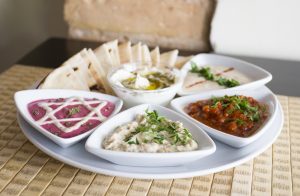
But beware of the hummus. The chickpea puree with pita bread disappears rapidly and fills the belly considerably. From hummus with tahini and chickpeas to hummus with mushrooms garnished with oriental mushroom ragout over to hummus with roast lamb and ground beef as well as fried onions and even hummus with Jerusalem mix, consisting of fried chicken breast, heart and liver, to humus “pargiot” with chicken legs in a mint marinade, up to hummus with kebab, being lamb and beef on top plus mint and parsley. And if you especially like Sephardic cuisine, you can add eggs – haminados, which were cooked overnight in the hamin.
If you are addicted to eggs, order Shakshuka. Then two eggs are served on a tomato and pepper sauce with two pita. Please do not carve into it with a knife, yes – right – tear in pieces by hand.
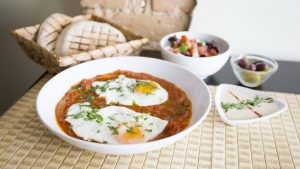
We would also like to recommend the falafel plate with four fine falafel balls, as well as Israeli salad, which mainly consists of tomatoes and cucumbers, shallots and iceberg lettuce, red and white cabbage and tabbouleh. That in turn is a salad from the Arabic, especially the Lebanese and Syrian cuisine. In Berlin it is also known as Bulgur salad or – especially among the Turks – as Kisir. Instead of bulgur wheat, some cooks also take couscous, which is also known to consist of wheat, or more precisely: durum wheat, which is basically a semolina grated into pellets, which should be steamed and not cooked. But bulgur is wheat grout and not farina by far.
If you like Yorai Feinberg’s Jerusalem mix, that is fried chicken breast fillet with heart and liver, you can get a large portion of it or have Hamin. This is overnight cooked beef with vegetables and legumes, in which Haminados eggs went for a dance.
Speaking of dancing: Yorai Feinberg, a native of Jerusalem, studied ballet, lived and danced in London and Paris, Tokyo and Tel Aviv, Stuttgart and Stockholm.
For more than a handful of years now he lives in Berlin and runs the restaurant Feinberg`s, where he presents one – his selection of Israeli dishes.
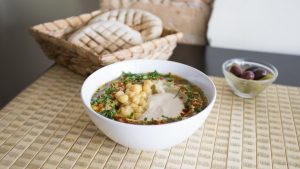
For the past 70 years, immigrants from 70 countries have also brought their habits from the kitchen to Israel, and most of the recipes are likely to be kosher enough to kosher them with kosher ingredients in a kosher kitchen. At least kosher light or kosher style should – strictly speaking – be possible.
Feinberg’s cuisine is considered more or less kosher and in the menu we really only find poultry, lamb and beef, that is meat from ruminating cloven-hoofed animals.
And wine from Israel. The winegrowers owe the fact that Israel is considered a wine country to one of the Rothschild family founded in Frankfurt am Main. In 1886 wine presses were donated by the Paris branch of Rothschild’s to settlers, who wanted to rebuild their lives on the western slopes of the Carmel Mountains. The soil was good, the climate as well. From then on kosher wines were produced. The Carmel wineries, which produce bulk wine but can also produce quality wine, are the largest wine producer in Israel, based in Rishon LeZion. Visitors can try their wines in Zichron Ja’akow. Most of the other 200 winegrowers in Israel usually have smaller farms that also grow wine in the mountains of Galilee and on the Golan Heights and export to Berlin. See more soon – here in the mag Gastrosofie.
We like meze and continue with small dishes for dessert. Baklava – taken in hand – and Malabi (pudding with rose water, coconut and pistachios) properly spooned – are a real treat to remember. Fine food and drink at Feinberg’s – feel like coming again…
Restaurant Feinberg`s
Fuggerstraße 35, 10777 Berlin
Telephone: 0049 (0) 30 91553462, Email: info@feinbergs.de, Web: www.feinbergs.de
Opening hours: Tuesdays to Sundays from noon to 11 pm
Remark:
Christopher Prescott – article based on a text by Ole Bolle.



